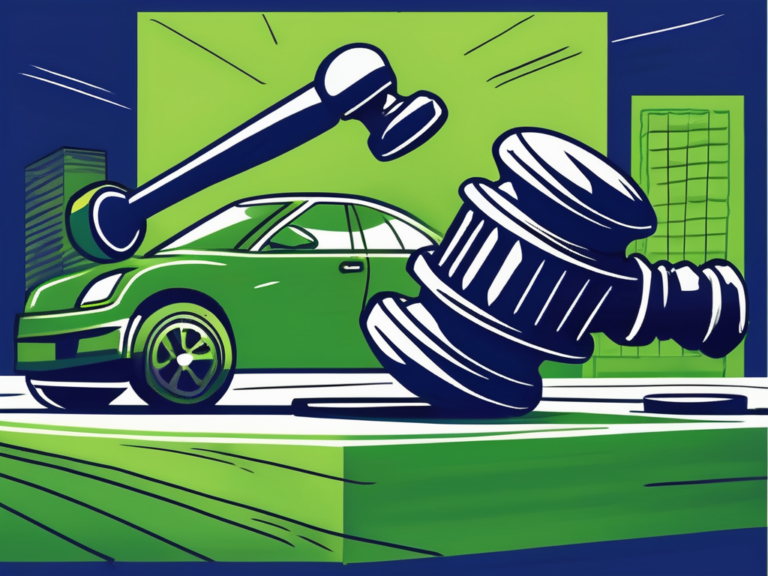Talk to Sales: (401) 200-6026

In the highly regulated world of the automotive industry, dealer compliance is not something to be taken lightly. For dealerships, understanding and adhering to compliance regulations is crucial to ensure a smooth and successful business operation. In this article, we will dive deep into the world of dealer compliance, exploring its definition, importance, key components, regulatory bodies, steps to achieve compliance, risks of non-compliance, and the future of compliance regulations.
Understanding Dealer Compliance
Dealer compliance refers to the set of guidelines and regulations that automotive dealerships must follow to ensure ethical and legal practices during their operations. It encompasses various aspects of the dealership’s business, ranging from ethical conduct to financial transparency. Dealer compliance is not only essential for the reputation and trustworthiness of a dealership, but it also helps protect consumers and employees.
Definition and Importance of Dealer Compliance
Dealer compliance is the implementation of policies and procedures to ensure that the dealership operates within the confines of the law and industry standards. It covers areas such as advertising, sales practices, customer relations, financial transactions, data privacy, and employee training.
Compliance is vital for dealerships as it helps establish trust with customers, builds a solid reputation within the community, and mitigates legal risks. By adhering to compliance regulations, dealers can avoid costly fines, legal disputes, and reputational damage.
Key Components of Dealer Compliance
Dealer compliance consists of several key components that dealerships need to be well-versed in. These include:
Advertising Compliance: Dealerships must ensure that their advertisements are accurate, transparent, and compliant with local and national regulations.
Advertising compliance is crucial for dealerships to maintain their integrity and credibility. It involves carefully crafting advertisements to provide accurate information about the vehicles, pricing, and any promotional offers. Dealerships must avoid using misleading tactics or false claims that could mislead potential customers. By adhering to advertising compliance, dealerships can build trust with their target audience and attract more customers.
Sales Practices Compliance: This involves following ethical sales practices, such as providing accurate information to customers, avoiding misleading tactics, and abiding by pricing regulations.
Sales practices compliance is essential for dealerships to ensure fair and transparent transactions with customers. It includes providing accurate and detailed information about the vehicles, including their features, condition, and history. Dealerships must avoid using high-pressure sales tactics or engaging in deceptive practices that could harm the customer’s interests. By adhering to sales practices compliance, dealerships can build long-term relationships with customers based on trust and satisfaction.
Customer Relations Compliance: Dealerships must handle customer complaints and disputes in a fair and timely manner, ensuring that customer satisfaction remains a top priority.
Customer relations compliance is crucial for dealerships to maintain positive relationships with their customers. It involves promptly addressing customer complaints, resolving disputes, and providing exceptional customer service. Dealerships must have a well-defined process for handling customer concerns and ensuring that their needs are met. By adhering to customer relations compliance, dealerships can enhance customer loyalty and attract new customers through positive word-of-mouth.
Financial Transactions Compliance: Ensuring financial transparency and integrity in all financial transactions is crucial. Compliance with anti-money laundering laws and reporting requirements is vital for dealerships.
Financial transactions compliance is essential for dealerships to maintain their financial integrity and prevent money laundering activities. It involves implementing robust financial controls, conducting due diligence on customers, and complying with anti-money laundering laws and reporting requirements. Dealerships must ensure that all financial transactions are transparent, properly documented, and in compliance with applicable regulations. By adhering to financial transactions compliance, dealerships can safeguard their financial reputation and prevent legal and financial risks.
Data Privacy Compliance: Protecting customer information and complying with data privacy laws is of utmost importance in today’s digital age.
Data privacy compliance is crucial for dealerships to protect customer information and maintain their trust. It involves implementing strict data protection measures, obtaining customer consent for data collection and processing, and complying with relevant data privacy laws, such as the General Data Protection Regulation (GDPR). Dealerships must ensure that customer data is securely stored, and only used for legitimate purposes. By adhering to data privacy compliance, dealerships can demonstrate their commitment to customer privacy and protect themselves from data breaches and legal consequences.
Employee Training and Compliance: Dealerships should provide comprehensive training to their employees on compliance regulations and ensure that they follow them diligently.
Employee training and compliance are essential for dealerships to ensure that all employees are aware of and adhere to compliance regulations. It involves providing comprehensive training programs on various compliance topics, such as advertising regulations, sales practices, customer relations, financial transactions, and data privacy. Dealerships must regularly update their employees on any changes in compliance regulations and conduct periodic assessments to ensure ongoing compliance. By prioritizing employee training and compliance, dealerships can create a culture of compliance and minimize the risk of non-compliance issues.
Sell cars on the lot faster with AutoRaptor
Know if we’re the right fit within 10 minutes
Regulatory Bodies and Dealer Compliance
Regulatory bodies play a pivotal role in overseeing and enforcing compliance within the automotive industry. These organizations are responsible for setting and maintaining standards for dealerships to follow.
Role of Regulatory Bodies in Dealer Compliance
Regulatory bodies, such as the Federal Trade Commission (FTC) in the United States and the Financial Conduct Authority (FCA) in the United Kingdom, establish rules and regulations that dealerships must adhere to. They monitor compliance, investigate complaints, and take enforcement actions against non-compliant dealerships.
Common Regulations Affecting Dealers
Dealerships are subject to a wide range of regulations, depending on the region and country they operate in. Some common regulations affecting dealers include:
- Truth in Lending Act (TILA) in the United States
- Canadian Motor Vehicle Arbitration Plan (CAMVAP) in Canada
- Financial Services and Markets Act (FSMA) in the United Kingdom
- General Data Protection Regulation (GDPR) in the European Union
It is vital for dealerships to stay up-to-date with the latest regulations and ensure compliance to avoid legal repercussions.
Achieving Dealer Compliance
While navigating dealer compliance may seem like a daunting task, there are steps that dealerships can take to ensure they are in compliance with regulations.
Steps to Ensure Compliance
- Educate Yourself: Stay informed about the regulations that apply to your dealership. Familiarize yourself with industry best practices and consult legal experts if needed.
- Create a Compliance Program: Develop a comprehensive compliance program tailored to your dealership’s specific needs. This program should include policies, procedures, and training materials.
- Document Everything: Keep thorough records of compliance efforts, training sessions, and any incidents related to compliance.
- Regularly Review and Update: Review your compliance program regularly to ensure it remains effective and up-to-date with current regulations.
- Provide Ongoing Training: Continual employee training is crucial to ensure compliance awareness and adherence throughout the dealership.
Tools and Resources for Compliance
Dealerships can leverage various tools and resources to simplify the compliance process. These include:
- Compliance management software
- Industry-specific training programs
- Consultation services from legal experts
- Industry associations providing guidance and support
Investing in these resources can significantly contribute to achieving and maintaining dealer compliance.
Risks and Consequences of Non-Compliance
The risks and consequences of non-compliance can be severe and can impact both the dealership and its stakeholders.
Legal Implications of Non-Compliance
Non-compliance can lead to legal repercussions, including lawsuits, fines, and sanctions. These legal issues can damage the dealership’s reputation, financial stability, and even result in the loss of licenses or permits necessary to operate.
Financial and Business Impact of Non-Compliance
The financial impact of non-compliance can be significant. Fines and legal expenses can drain resources, and the resulting damage to the dealership’s reputation can lead to reduced customer trust and decreased sales.
Moreover, non-compliance may result in the loss of business opportunities, partnerships, and contracts. Regaining trust and rebuilding a tarnished reputation can be a lengthy and challenging process.
Sell cars on the lot faster with AutoRaptor
Know if we’re the right fit within 10 minutes
Future of Dealer Compliance
As regulations adapt to industry advancements and changing consumer demands, the future of dealer compliance is likely to evolve as well. Dealerships must stay proactive and prepared for anticipated changes in compliance requirements.
Emerging Trends in Dealer Compliance
Technological advancements, such as digital retailing and data analytics, are driving changes in compliance regulations. Cybersecurity and data privacy are expected to become even more critical to protect customer information and prevent fraud.
Preparing for Changes in Compliance Regulations
To prepare for upcoming changes in compliance regulations, dealerships should:
- Stay informed about industry trends and regulatory updates through industry publications and associations.
- Adapt internal processes to align with anticipated changes, such as enhancing data protection systems and implementing cybersecurity measures.
- Conduct regular compliance audits to ensure ongoing adherence to changing regulations.
- Invest in training and education to keep employees updated on emerging compliance issues.
By being proactive and adaptable, dealerships can position themselves for success amidst changing compliance regulations.
Conclusion
In the world of automotive dealership, dealer compliance is a topic of paramount importance. Understanding the definition, key components, regulatory bodies, and steps to achieve compliance is crucial to navigate the complex regulatory landscape. Compliance is not only a legal and ethical obligation but also a way to build trust, maintain reputation, and protect the dealership’s financial stability. By prioritizing compliance, dealerships can steer clear of legal issues, financial pitfalls, and establish themselves as trusted industry players, well-prepared for the future of compliance regulations.
Want to improve your sales and move cars off the lot faster? Book a test drive with AutoRaptor to see how our simple dealership CRM software can help you close more deals effectively.
Subscribe to our Newsletter
Resources to help your dealership convert more leads into sales, retain more customers, and market inventory smarter, straight to your inbox every Sunday.




